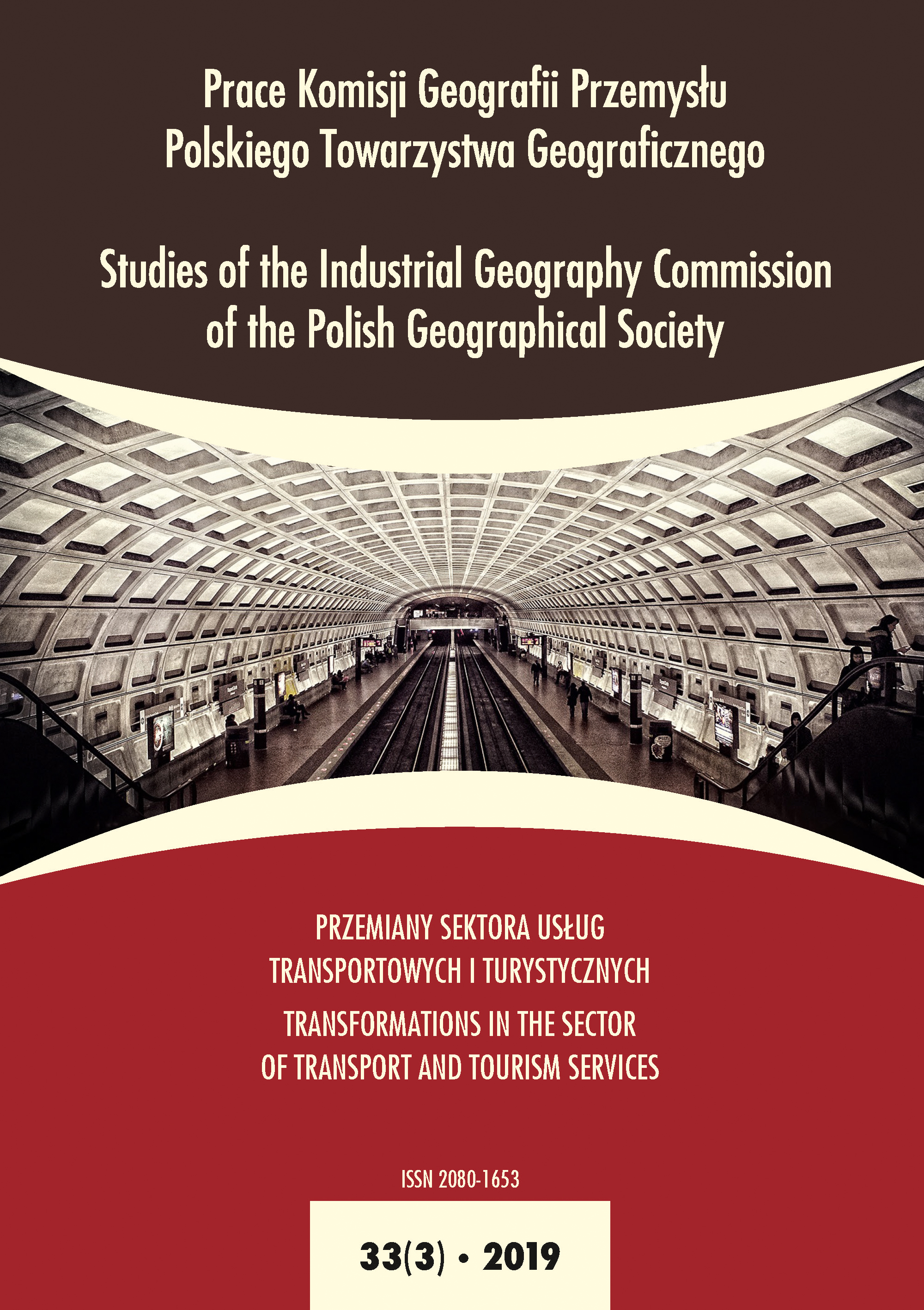Tourist Flows and the Level of Socio-Economic Development of Mauritius
DOI:
https://doi.org/10.24917/20801653.333.7Keywords:
disurbanisation/desurbanisation, factors of tourism development, Human Development Index (HDI), social and economic development, tourism/tourist flows, Wealth Index (GDP)Abstract
The development of tourism can cause both positive and negative changes in the development of the local society of Mauritius. The positive aspect refers to the growing number of tourists. On the one hand, it is observed in the number of incoming tourists and principally determines the amount of export revenues caused by touristic products. On the other hand, such a number indicates the increasing trends in the range of Human Development Index (HDI) and Wealth Index - understood as the size of Gross Domestic Product (GDP) of the residents. Yet, the negative changes caused by the tourist flows in the densely populated Mauritius are associated with overloading of the touristic space, which directly refers not only to the so-called ecological costs (waste or conflict related to drinking water), but it can also cause the unwillingness in the sphere of the direct contact between local people and tourists. This article aims to show the development of tourism of Mauritius and its positive and negative impacts on the local community on the basis of studies of diagnostic and performance, analysis and evaluation of the role of tourism in the socio-economic development of Mauritius.
Downloads
Metrics
References
Bandyopadhyay, R., Ganguly, T. (2015). Situating the Tourist Gaze: From Appropriation to Negotiation, Current Issuesin Tourism, 1–17.
Conti, G., Perelli, C. (2007). Governing Tourism Monoculture: Mediterranean Mass Tourism Destinations and Governance Networks. W: P.M. Burns, M. Novelli (ed.). Tourism and Politics. Global Frameworks and Local Realities. Amsterdam: Elsevier, 235–261.
Dłużewska, A., Gonia, A., Michniewicz-Ankiersztajn, H., Podgórski, Z. (2014). Współczesne problemy turystyki, Bydgoszcz: Ośrodek Sportu, Rekreacji i Edukacji w Poznaniu.
Giezgała, J. (1969, 1977). Turystyka w gospodarce narodowej. Warszawa: Polskie Wydawnictwo Ekonomiczne.
Human Development Report (2018). UNDP: United Nations Development Programme.
Jackiewicz, E.L., Klak, Th. (2016). Mass and Alternative Tourism in Latin America and the Caribbean. W: E.L. Jackiewicz, F.J. Bosco (ed.). Placing Latin America. Contemporary Themes in Geography. Lanham: Rowman & Littelfield, 95–112.
Jasiński, M. (2006). Aspekty monokulturowe gospodarki turystycznej. Zeszyty Naukowe Kolegium Gospodarki Światowej, 20, 92–102.
Jasiński, M. (2008). Zrównoważony rozwój w monokulturowych gospodarkach turystycznych. W: S. Wodejko (red.). Zrównoważony rozwój turystyki. Warszawa: Szkoła Główna Handlowa w Warszawie.
Jasiński, M., Masłoń-Oracz, A. (2017). Rolnictwo i turystyka w rozwoju społeczno-ekonomicznym Mauritiusa. Zeszyty Naukowe Szkoły Głównej Gospodarstwa Wiejskiego, 17(3), 145–153. doi: 10.22630/PRS.2017.17.3.61
Kachniewska, M., Nawrocka, E., Niezgoda, A., Pawlicz, A. (2012). Rynek turystyczny. Ekonomiczne zagadnienia turystyki. Warszawa: Wolters Kluwer.
Kowalczyk-Anioł, J., Zmyślony, P. (2017). Turystyka miejska jako źródło protestów społecznych: przykłady Wenecji i Barcelony. Turystyka Kulturowa, 2, 7–36.
Kurek, W. (red.). (2007). Turystyka. Warszawa: Wydawnictwo Naukowe PWN.
Mika, M. (2007). Przemiany pod wpływem turystyki na obszarach recepcji turystycznej. W: W. Kurek (red.). Turystyka. Warszawa: Wydawnictwo Naukowe PWN, 406–470.
Mika, M. (2014). Założenia i determinanty podtrzymywalności lokalnego rozwoju turystyki. Kraków: Instytut Geografii i Gospodarki Przestrzennej Uniwersytetu Jagiellońskiego.
Mowforth, M., Munt, I. (2003). Tourism and Sustainability: Development and New Tourism in the Third World. London: Routledge.
Murray, G. (2007). Constructing Paradise: The Impacts of Big Tourism in the Mexican Coastal Zone. Coastal Management, 35, 339–355.
Murzyn, M. (2015). Wpływ turystyki masowej na dziedzictwo Zakopanego. Turystyka Kulturowa, 10, 72–85.
Nawrocka, E. (2010). Rozwój turystyki i rozwój zrównoważony. Prace Naukowe Uniwersytetu Ekonomicznego we Wrocławiu. Ekonomia, 140, 87–100.
Sharpley, R. (2014). Host perceptions of tourism: A review of the research. Tourism Management, 42, 37–49.
Theuns, H.L. (2011). Analiza strukturalna rozmiarów rzeczywistych i potencjalnych wycieków/ powiązań w gospodarce turystycznej Karaibów. Folia Turistica, 25(2), 123–152.
Uysal, M., Perdue, R., Sirgy, J. (red.) (2012). Handbook of Tourism and Quality-of-life Research: Enhancing the Lives of Tourists and Residents of Host Communities. Berlin: Springer Science & Business Media.
Warszyńska, J. (red.) (1995). Geografia turystyczna świata. Część 2. Warszawa: Wydawnictwo Naukowe PWN.
Weaver, D.B. (2017). Core-periphery Relationships and the Sustainability Paradox of Small Island Tourism. Tourism Recreation Research, 42(1), 1–11.
Wodejko, S. (1998). Ekonomiczne zagadnienia turystyki. Warszawa: Wyższa Szkoła Handlu i Prawa.
Downloads
Published
How to Cite
Issue
Section
License
Articles are published under the terms of the Creative Commons License (CC BY-ND 4.0; Attribution– NoDerivs).

